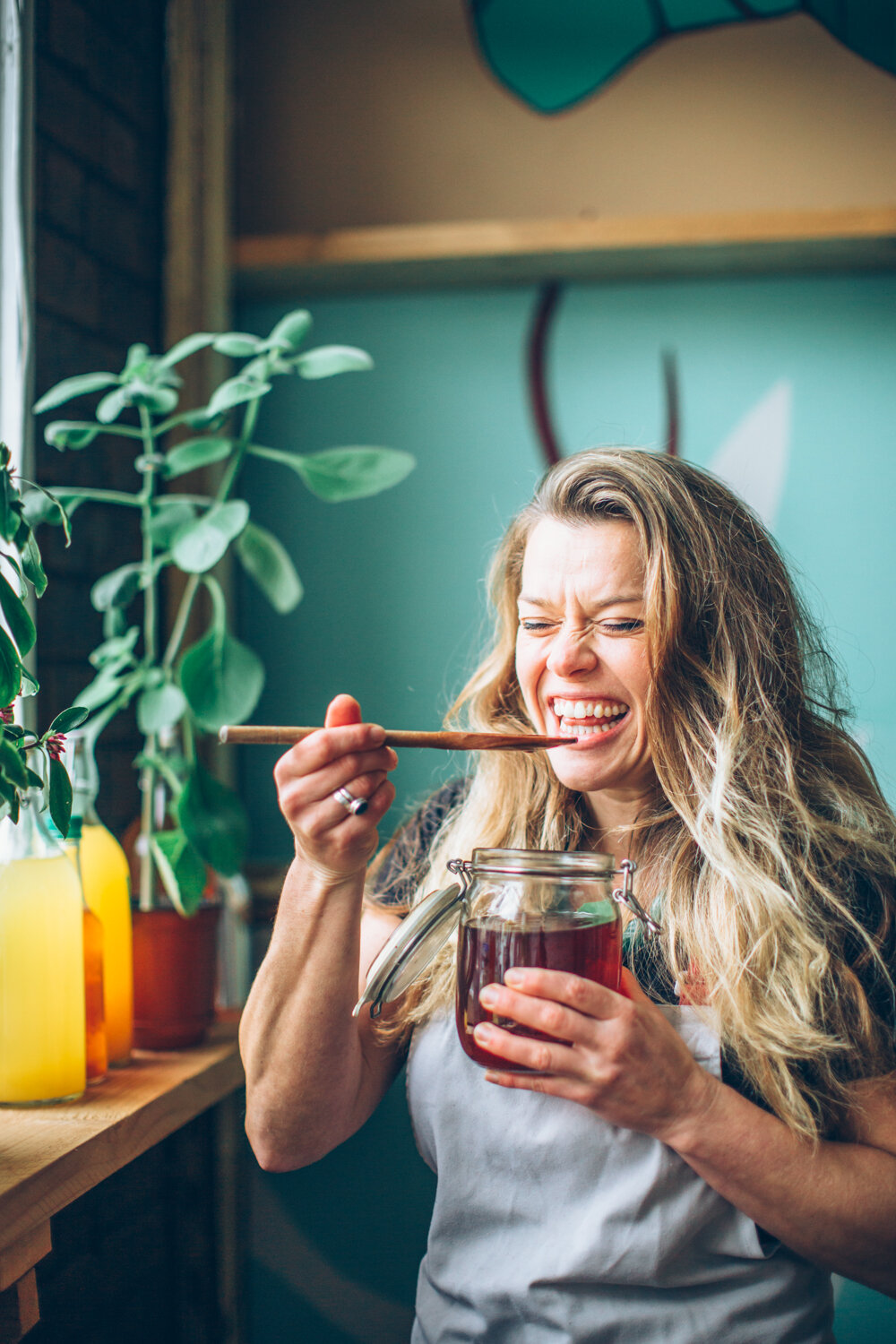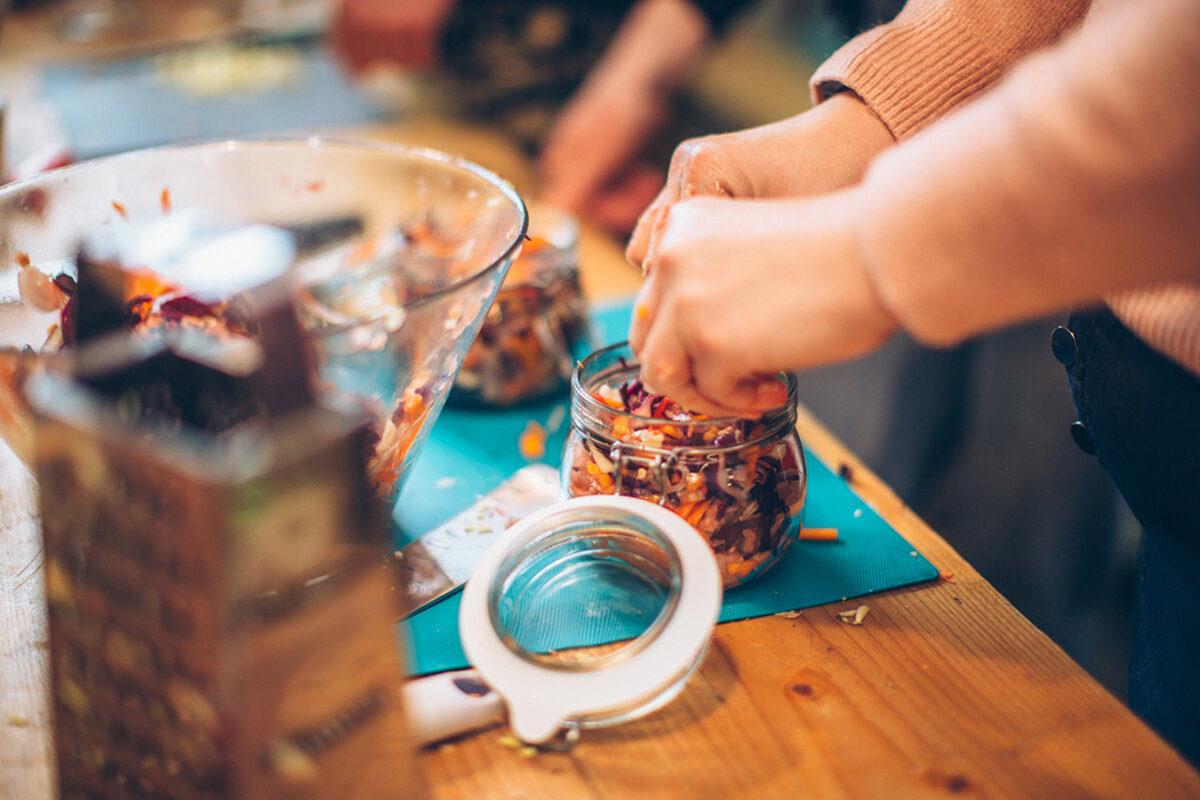Well Nourished | Fermentation
Fermentation is everywhere these days. Even the mainstream supermarkets stock a wide variety of probiotic yoghurts, kombuchas, kimchi and sauerkraut. But what exactly are these exotically-named gourmet goods and why should you get on board the DIY fermentation train? Simply put, fermentation is the conversion of carbohydrates into alcohol or lactic acid but there is a lot more to it than that. Read on to discover our ten top reasons to enjoy fermentation…
WORDS | JOSEPHINE BOSWELL
1. Healthy body, healthy mind
Both mental and physical illness can be attributed to poor gut health and when our internal ecosystem is out of balance we suffer. Over-consumption of antibiotics, alcohol, processed foods, stress and smoking can all strip our intestines of its healthy bacteria. This reduces our ability to fully absorb the nutrients from our food and can also allow unhealthy bacterias to thrive causing illness, fatigue, discomfort and general poor health. By eating and drinking fermented food and drinks, full of probiotics, lactobacilli and healthy bacteria, we are restocking our inner ecosystems and fortifying our immune systems.
2. Simple as 1, 2, Kimchi!
Fermenting your own food and drink at home is easy. You don't need a tonne of equipment, complicated temperature checks or any specialised kit. Most ferments involve combinations of salt, water, sugar, fruit and vegetables stored in any sterilised jars and containers you can get your hands on. Fermenting mostly involves waiting patiently for your microbial friends to do the hard work, for example transforming milk into kefir, tea into kombucha, and carrots and cabbage into kimchi and sauerkraut.
3. As economical as it is easy
Once you have a starter culture and for kimchi you don't even need this, you can make kombucha and kefir with just a few teabags, sugar and milk. Compared with commercially produced versions DIY fermentation is incredibly cost-effective.
4. Fermented food is delicious
Whether its mango-infused kombucha, second-ferment strawberry kefir on muesli, toasted sourdough with tahini, kimchi and a fried egg, kefir and banana smoothie, kimchi fried rice or coriander and sunflower seed kefir pesto, fermented foods are seriously tasty! They instantly transform an ordinary meal into something special, whether enjoyed alongside other foods or as a snack in their own right.
5. Experiment with flavour
DIY fermentation can be fine tuned to suit you. Spice monster? Sweet tooth? Salt fiend? Everybody has different taste, so experiment with the amount of sugar, salt, garlic, chilli, ginger and other flavourings. It's fun, creative, and because all the ingredients are inexpensive, you don't need to worry about making a mistake. Play around and see what kind of magic you can make happen with a few vegetables, salt, water and a Kilner jar!
6. It's safe
We have all read horror stories about food poisoning contracted from eating unsterile tinned or preserved foods, but you'll be relieved to know that fermentation is very safe. Most of the time fermented foods smell absolutely delicious, but if something has gone wrong you will know about it! Rancid smells or visible mould are obvious indicators of a problem. It doesn't happen often, but if it does, chuck it in the compost and start again.
7. An ancient art
Fermentation is far from a hip, new concept; it's an ancient culinary art that mankind has relied on for over 7,000 years to preserve and improve food and drink. Indeed, fermentation was an essential part of our survival as a species. Wine, beer and bread are the oldest known ferments and are still staples to this day. A few thousand years later we began to enjoy yoghurt, cheese, kefir, kimchi, and sauerkraut amongst other fermented foods. Every civilisation has its unique ferment tradition and there isn't a country in the world that doesn't use fermentation. As the king of fermentation, Sandor Katz, states "without culturing there is no culture.”
8. Make it personal
So why not just buy some kefir or kimchi from the supermarket? Aside from the financial savings, making your own fermented foods means you can tailor the recipe to suit your tastebuds, adjusting the levels of salt, sugar and flavourings to your own personal preference. Your ferments will also be considerably fresher than shop-bought options. Commercial ferments have to be stabilised and often pasteurised, killing around 50% of the beneficial bacteria produced in the fermenting process. Additionally, many commercial ferments contain flavourings, sweeteners and chemical preservatives, which dilutes their nutritional value.
9. Mysterious and magical
Science is still learning about the complex and intelligent world of microbes; yet for all our medical advances, the starter cultures for kefir and kombucha cannot be replicated or synthetically produced in a laboratory. It is not known where the first kefir grains came from but legend has it that the Prophet Mohammed gifted them to the people of the Caucasus, who guarded these precious jewels and the process by which kefir is made for over a thousand years. Other cultures consider fermentation a deeply sacred process. The Cherokee people describe it as 'the birth of the good spirit', as it turns simple ingredients into something that protects and defends the body from illness and harmful bacteria.
10. Have fun with your ferments
Like a witch concocting magical spells in her cauldron, fermenting is FUN! And like a spell to mend, protect or improve, ferments can be adjusted to suit whatever need or ailment you might have. Feel a cold coming on? Chuck in more garlic and ginger to your kimchi. Too many cabbages in your veg box this week? Turn them into sauerkraut. Kids love making ferments too. Get messy in the kitchen with kimchi, or enjoy checking the kombucha each day to taste the subtle changes as the SCOBY (Symbiotic Culture of Bacteria and Yeast) slowly works its magic and converts tea and sugar into a tasty drink.
If this has inspired you to get started with making your own fermented foods, join Jo for a fermentation workshop to pick up all the tips and tricks you'll need. You'll go home equipped with your first ferments and all the knowledge you need to continue fermenting at home.




